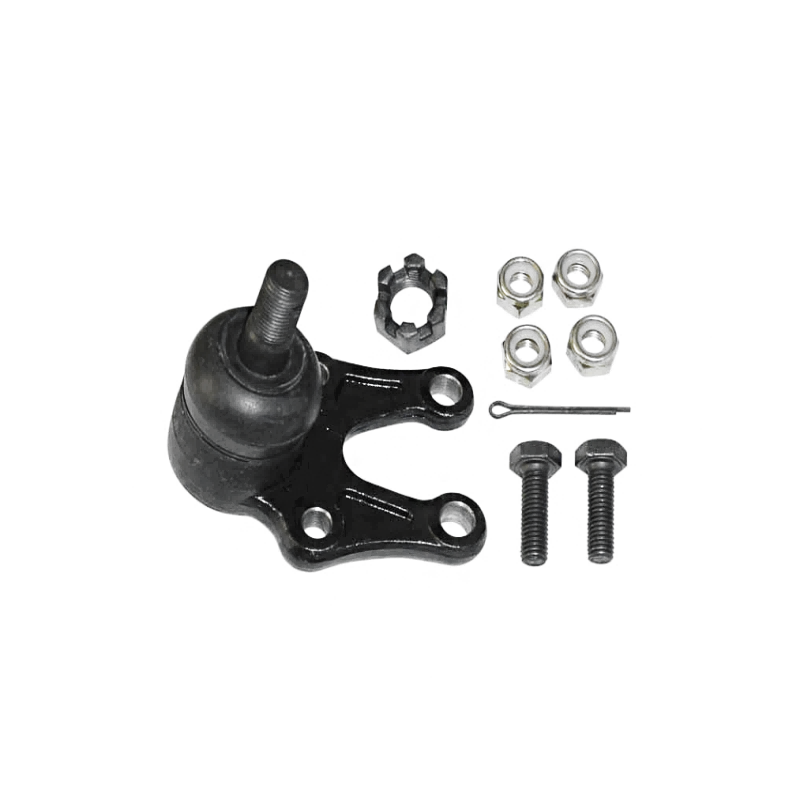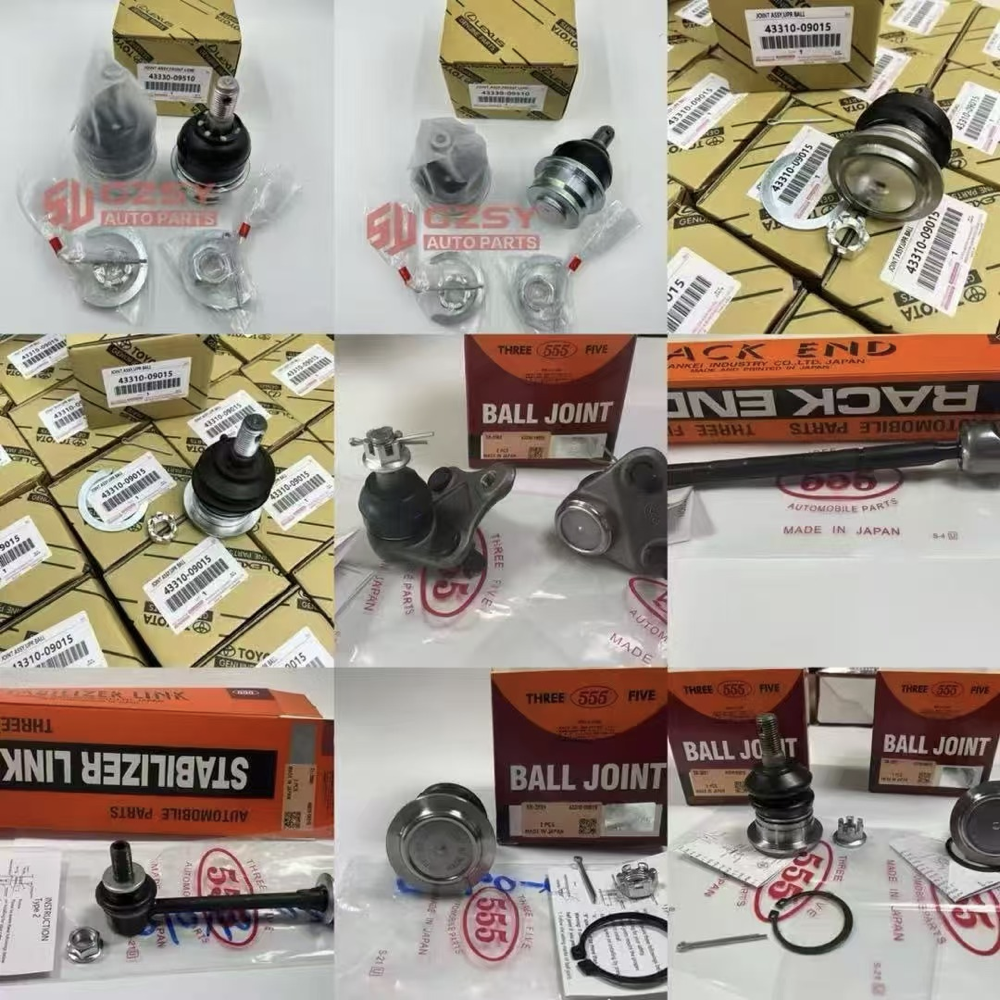China has established itself as the global manufacturing hub for automotive components, with Toyota auto parts wholesale representing one of the most significant segments in the industry. The country's automotive aftermarket has experienced exponential growth, driven by advanced manufacturing capabilities, competitive pricing, and stringent quality control measures. Chinese suppliers have invested heavily in research and development, enabling them to produce OEM-quality parts that meet international standards while offering substantial cost advantages to distributors and retailers worldwide.

The Toyota parts manufacturing ecosystem in China encompasses thousands of suppliers ranging from large-scale industrial complexes to specialized component manufacturers. These suppliers have developed sophisticated supply chain networks that enable rapid production cycles and efficient global distribution. The integration of advanced technologies such as precision machining, automated assembly lines, and computer-aided quality inspection systems has elevated the standard of Chinese-manufactured Toyota components to unprecedented levels of reliability and performance.
Leading Industrial Manufacturers
Guangzhou Automotive Components Corporation
Guangzhou Automotive Components Corporation stands as one of China's premier Toyota parts manufacturers, specializing in engine components, transmission systems, and electrical parts. The company operates multiple production facilities across Guangdong Province, utilizing state-of-the-art manufacturing equipment and maintaining ISO 9001 certification. Their product portfolio includes over 15,000 different Toyota part numbers, ranging from basic maintenance items to complex mechanical assemblies.
The corporation's commitment to quality assurance is evident through their comprehensive testing protocols and quality management systems. Each component undergoes rigorous inspection procedures, including dimensional analysis, material composition verification, and performance testing under simulated operating conditions. This meticulous attention to detail has earned them recognition as a trusted supplier among international distributors seeking reliable Toyota auto parts wholesale solutions.
Shanghai Precision Manufacturing Group
Shanghai Precision Manufacturing Group has carved out a significant market position through their specialization in high-precision mechanical components for Toyota vehicles. The company's expertise lies in manufacturing brake systems, suspension components, and steering mechanisms that require exact tolerances and superior metallurgical properties. Their modern facilities incorporate computer numerical control machinery and automated quality inspection systems to ensure consistent product quality.
The group's research and development division works closely with automotive engineers to develop innovative solutions that enhance vehicle performance and safety. Their collaborative approach with international clients has resulted in the development of proprietary manufacturing processes that improve component durability while reducing production costs. This combination of technical excellence and competitive pricing has positioned them as a preferred supplier for global automotive parts distributors.
Specialized Component Suppliers
Zhejiang Electronic Systems Limited
Zhejiang Electronic Systems Limited focuses exclusively on electronic and electrical components for Toyota vehicles, including sensors, control modules, and wiring harnesses. The company has invested extensively in clean room manufacturing facilities and advanced electronic testing equipment to meet the stringent requirements of modern automotive electronics. Their product development team consists of experienced engineers who understand the complexities of automotive electrical systems and safety regulations.
The company's quality management system incorporates real-time monitoring of production processes and comprehensive traceability systems that track each component from raw materials through final assembly. This systematic approach to quality control ensures that every electronic component meets or exceeds OEM specifications for reliability and performance. Their commitment to continuous improvement has resulted in numerous certifications including ISO/TS 16949 and environmental management standards.
Tianjin Filtration Technology Corporation
Tianjin Filtration Technology Corporation specializes in manufacturing air filters, oil filters, fuel filters, and cabin air filters specifically designed for Toyota vehicles. The company utilizes advanced filtration media and precision manufacturing techniques to produce filters that provide superior contaminant removal while maintaining optimal flow characteristics. Their research laboratory conducts extensive testing to validate filter performance under various operating conditions.
The corporation's manufacturing processes incorporate automated assembly systems and statistical process control methods to ensure consistent product quality and dimensional accuracy. Their quality assurance team performs regular audits of supplier materials and maintains strict adherence to Toyota's original equipment specifications. This dedication to excellence has established them as a reliable source for Toyota auto parts wholesale customers seeking high-quality filtration components.
Regional Manufacturing Hubs
Dongguan Industrial District
The Dongguan Industrial District represents one of the most concentrated automotive manufacturing regions in China, hosting numerous suppliers specializing in Toyota parts production. This geographic concentration provides significant advantages including shared infrastructure, specialized workforce availability, and efficient logistics networks. The district's suppliers benefit from economies of scale and collaborative relationships that enable rapid response to market demands and customer requirements.
Companies within this district have developed integrated supply chains that support just-in-time manufacturing principles and flexible production scheduling. The proximity of multiple suppliers enables efficient coordination of complex assemblies and reduces transportation costs for both raw materials and finished products. This operational efficiency translates into competitive pricing advantages for international customers seeking comprehensive Toyota auto parts wholesale solutions.
Wuhan Manufacturing Zone
The Wuhan Manufacturing Zone has emerged as a strategic location for automotive parts production due to its central geographic position and excellent transportation infrastructure. Suppliers in this region specialize in heavy-duty components such as engine blocks, transmission housings, and chassis components that require substantial manufacturing capabilities. The zone's proximity to steel production facilities and other raw material sources provides cost advantages for metal-intensive components.
Manufacturing facilities in Wuhan have implemented lean production methodologies and advanced quality management systems to optimize efficiency and minimize waste. The region's suppliers maintain extensive quality certification programs and work closely with international standards organizations to ensure compliance with global automotive industry requirements. This commitment to operational excellence has attracted major automotive distributors seeking reliable long-term partnerships.
Quality Assurance Standards
International Certification Requirements
Chinese Toyota parts manufacturers have embraced international quality standards as fundamental requirements for market participation. ISO/TS 16949 certification has become the baseline standard for automotive suppliers, requiring comprehensive quality management systems that address every aspect of production from design through delivery. These standards mandate rigorous documentation procedures, statistical process control implementation, and continuous improvement methodologies.
Advanced suppliers have pursued additional certifications including environmental management standards and occupational health and safety requirements. These comprehensive certification programs demonstrate commitment to sustainable manufacturing practices and responsible corporate governance. The resulting quality management systems provide confidence to international customers regarding product reliability and supplier stability for long-term business relationships.
Testing and Validation Protocols
Modern Toyota parts manufacturers in China employ sophisticated testing and validation protocols that exceed original equipment requirements. These protocols include accelerated life testing, environmental stress testing, and performance validation under extreme operating conditions. Testing laboratories utilize advanced measurement equipment and data analysis systems to validate component performance and identify potential improvement opportunities.
Supplier quality teams conduct regular audits of manufacturing processes and implement corrective action procedures when quality issues are identified. This proactive approach to quality management prevents defective products from reaching customers and maintains consistent product performance over time. The comprehensive nature of these quality systems provides assurance to wholesale customers regarding product reliability and supplier accountability.
Supply Chain Management
Logistics and Distribution Networks
Chinese Toyota parts suppliers have developed sophisticated logistics and distribution networks that enable efficient global delivery of automotive components. These networks incorporate modern warehousing facilities, inventory management systems, and transportation coordination capabilities that support just-in-time delivery requirements. Strategic partnerships with international shipping companies provide reliable ocean freight services and expedited air freight options for urgent orders.
Advanced suppliers utilize enterprise resource planning systems that integrate production scheduling, inventory management, and customer order processing to optimize supply chain efficiency. Real-time visibility into inventory levels and production status enables proactive communication with customers regarding order status and delivery schedules. This level of supply chain sophistication supports the complex requirements of global Toyota auto parts wholesale distribution networks.
Inventory Management Systems
Modern inventory management systems employed by Chinese suppliers incorporate demand forecasting algorithms and automated replenishment procedures that minimize stockouts while optimizing inventory investment. These systems analyze historical demand patterns, seasonal variations, and market trends to predict future requirements and adjust production schedules accordingly. Integration with customer ordering systems provides real-time visibility into market demand and enables rapid response to changing requirements.
Warehouse management systems coordinate the storage and retrieval of thousands of different part numbers while maintaining accurate inventory records and ensuring proper material handling procedures. Automated identification systems and barcode tracking provide complete traceability throughout the supply chain and support efficient order fulfillment processes. This level of operational sophistication enables suppliers to meet the demanding requirements of international automotive parts distributors.
Market Trends and Future Outlook
Technology Integration Advances
The integration of advanced manufacturing technologies is transforming the Toyota parts manufacturing landscape in China. Industry 4.0 concepts including Internet of Things connectivity, artificial intelligence, and machine learning are being implemented to optimize production efficiency and enhance quality control capabilities. Smart manufacturing systems provide real-time monitoring of production parameters and enable predictive maintenance strategies that minimize downtime and improve overall equipment effectiveness.
Suppliers are investing in additive manufacturing technologies and advanced materials research to develop innovative solutions that improve component performance while reducing manufacturing costs. These technological advances enable the production of complex geometries and customized components that were previously impossible to manufacture using traditional methods. The continuous evolution of manufacturing capabilities ensures that Chinese suppliers remain competitive in the global automotive parts market.
Sustainability and Environmental Considerations
Environmental sustainability has become a critical consideration for Toyota parts manufacturers as global regulations and customer expectations drive demand for eco-friendly manufacturing practices. Chinese suppliers are implementing comprehensive environmental management systems that address energy consumption, waste reduction, and emissions control throughout their operations. Green manufacturing initiatives include the adoption of renewable energy sources, recycling programs, and sustainable packaging materials.
Life cycle assessment methodologies are being employed to evaluate the environmental impact of products from raw material extraction through end-of-life disposal. This holistic approach to environmental responsibility supports the development of products and processes that minimize environmental impact while maintaining performance requirements. The commitment to sustainability positions Chinese suppliers as responsible partners for environmentally conscious automotive distributors and retailers.
FAQ
What quality standards do Chinese Toyota parts manufacturers follow
Chinese Toyota parts manufacturers adhere to international quality standards including ISO/TS 16949 automotive quality management systems, which require comprehensive quality control procedures and continuous improvement processes. Most reputable suppliers also maintain additional certifications such as ISO 14001 environmental management and OHSAS 18001 occupational health and safety standards to ensure comprehensive operational excellence.
How do Chinese suppliers ensure compatibility with original Toyota specifications
Chinese manufacturers utilize detailed reverse engineering processes and maintain comprehensive databases of Toyota OEM specifications to ensure exact compatibility. They invest in advanced measurement equipment and coordinate closely with Toyota's technical documentation to verify dimensional accuracy, material properties, and performance characteristics match original equipment requirements precisely.
What are the typical lead times for Toyota auto parts wholesale orders from China
Standard lead times for Toyota auto parts wholesale orders typically range from 15 to 45 days depending on product complexity and order quantities. Suppliers maintain strategic inventory levels for high-demand items to support shorter delivery schedules, while custom or low-volume components may require extended production times to ensure quality and cost optimization.
How do Chinese suppliers handle quality issues and warranty claims
Reputable Chinese Toyota parts suppliers maintain comprehensive quality management systems that include defect tracking, root cause analysis, and corrective action procedures. Most established suppliers offer warranty programs that cover material defects and manufacturing issues, with clear procedures for claim processing and replacement part delivery to maintain customer satisfaction and business continuity.

